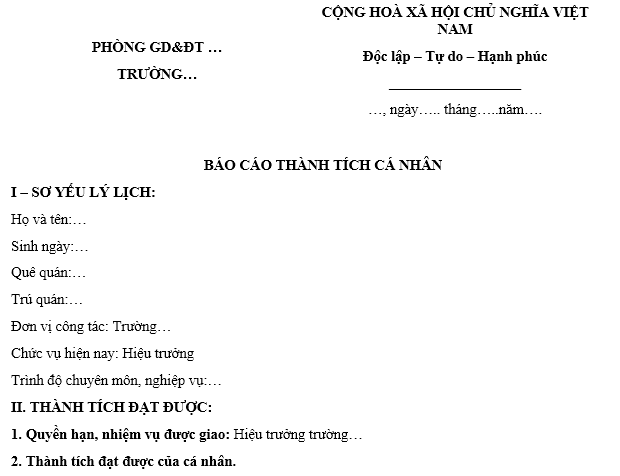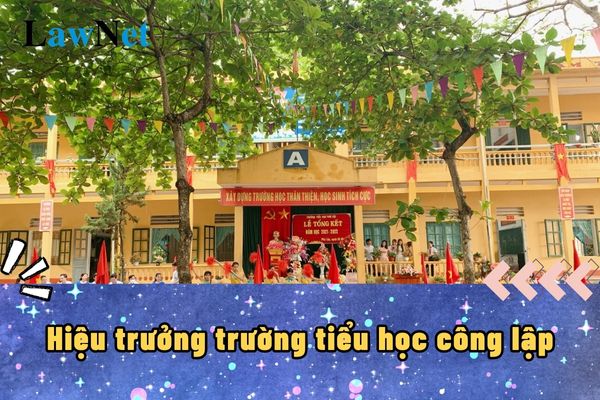What is the report form on the summary of achievements of the Principal of a public primary school in Vietnam?
What is the report form on the summary of achievements of the Principal of a public primary school in Vietnam?
The report form on the summary of achievements for the Principal or Vice Principal is a report documenting the activities and achievements of the head of the school over a specific period. This report is typically used to assess and evaluate the capabilities of the school’s head.
Currently, the report form on the summary of achievements is implemented according to Form No. 03 issued in conjunction with Decree 98/2023/ND-CP; thus we can refer to it to get the report form on the summary of achievements for the principal of a public primary school as follows:

>>> Download report form on the summary of achievements for the Principal of a public primary school 2024.

What is the report form on the summary of achievements for the Principal of a public primary school in Vietnam? (Image from the Internet)
Do Principals of public primary schools receive allowances for educators in Vietnam ?
Based on point d, clause 1, Article 11 of the Regulations on primary Schools issued in conjunction with Circular 28/2020/TT-BGDDT, which stipulates the duties and powers of the principal of a public primary school as follows:
- Developing the school's strategy and development plan; planning and organizing the implementation of teaching and educational plans; reporting and evaluating the results before the school council and competent authorities.
- Establishing professional groups, office groups, and merit-reward councils; disciplinary councils, advisory councils within the school; appointing group leaders and deputy group leaders; assigning teachers to be in charge of the Ho Chi Minh Young Pioneer Organization.
- Managing personnel, teachers, and staff as per legal regulations and guidance from educational management authorities; developing plans for professional development for teachers and staff; encouraging and facilitating teachers and staff to participate in educational innovation activities; evaluating and classifying teachers and staff as per the Ministry of Education and Training regulations; participating in recruitment, transfer, and arrangement of teachers; organizing the introduction of personnel for the appointment of vice principals by competent authorities.
- Managing and admitting students, permitting student transfers; deciding on discipline and rewards for students; approving student evaluation results, lists of students advancing to the next grade or repeating a grade; organizing tests to certify primary education completion for students within the school and other subjects in the school’s locality.
- Organizing the implementation of the primary education curriculum based on the Ministry of Education and Training's regulations; textbooks and local educational content as decided by the provincial People’s Committee. Managing, using, and selecting reference publications according to the Ministry of Education and Training's regulations.
- Participating in professional activities with professional groups; engaging in self-study and training to enhance professional and managerial competence. Attending training classes on politics, professional and managerial skills; teaching as per the prescribed teaching hours for principals.
- Managing administrative tasks; self-managing financial resources and assets of the school.
- Organizing the implementation of the grassroots democracy regulations; promoting socialization of education, coordinating organizations, and mobilizing social forces to participate in educational activities, enhancing the school’s role in the community.
- Building a safe, healthy, friendly learning environment and preventing school violence as per legal regulations.
- Entitled to allowances for educators and other preferential policies as prescribed.
Thus, according to the regulations, the principal of an primary school is entitled to allowances for educators.
Vietnam: Shall the school council convene if the Principal of a public primary school requests it?
Based on point d, clause 1, Article 10 of the Regulations on primary Schools issued in conjunction with Circular 28/2020/TT-BGDDT, which stipulates the operation of the school council of a public school as follows:
The school council meets regularly at least three times a year. In necessary cases, upon the request of the principal or at least one-third of the school council members, the chairman of the school council has the authority to convene an extraordinary meeting to address arising issues in the process of performing the school's duties and functions. The chairman of the school council may invite representatives of local authorities and organizations to attend the school council meetings if necessary.
The school council meeting is considered valid when at least three-fourths of the council members, including the chairman, are present. The resolutions of the school council are passed and effective when at least two-thirds of the present members agree. The resolutions of the school council are publicly announced.
The principal is responsible for implementing the resolutions or conclusions of the school council on the contents stipulated at point c, clause 1, Article 10 of the Regulations on primary Schools issued in conjunction with Circular 28/2020/TT-BGDDT.
If the principal disagrees with the school council's resolution, they must promptly report to and seek guidance from the immediate superior educational management authority.
While waiting for the competent authority's response, the principal must still implement the school council's resolution for matters not in conflict with current laws and these regulations.
We see that the school council meets regularly at least three times a year. In necessary cases, when the principal or at least one-third of the school council members request,
Thus, when there is a request from the principal of a public primary school, the school council will convene.

